Lufthansa
Cargo
Posts Record Profits
Lifts Tokyo Mercy Flight
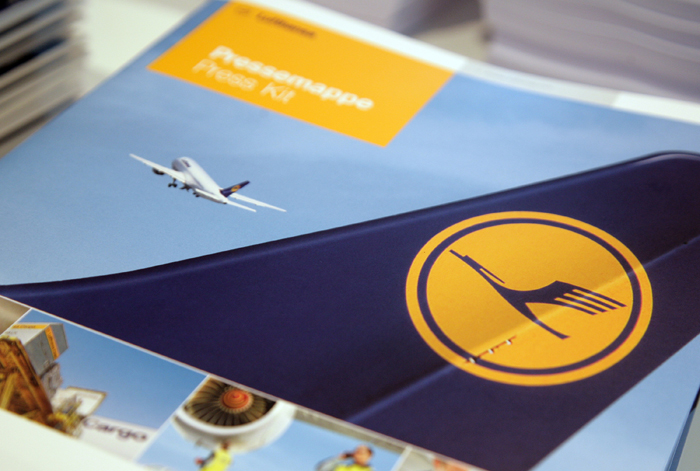
Karl Ulrich Garnadt was
extremely pleased:
“In 2009 we presented the poorest
result achieved in the history of Lufthansa Cargo.
“Today we are proud to announce
the best annual outcome ever achieved by Lufthansa Cargo,” stated
the carrier’s CEO.
“So far in 2011, revenues have remained
stable,” the executive pointed out.
Last year's numbers are indeed sparkling,
showing an operative profit of €310 million, contrasting sobering
losses in 2009 of €171 million..
Revenues totalled €2.8 billion and
the load factor reached 71 percent, thus climbing by 7.3 percent year-on-year.
All in all, LH Cargo not only improved its market position remarkably,
but left competitors like Air France-KLM-Martinair Cargo, Singapore
Airlines Cargo & Cargolux further behind.
The carrier’s financial turnaround
was prompted by a stiff cost-cutting program, the sidelining of up to
four MD-11 freighters (thus taking dispensable capacity out of the market),
major network adjustments and the overall global recovery of the industry.
New Leader Cuts Great Figure…
Karl Ulrich Garnadt (53), new Lufthansa
Cargo Chairman and CEO, reported record financials today In Frankfurt.
The German Cargo carrier showed
a strong recovery 2010, posting an annual operating result of
€310 million euros.
This is a record figure after a
sobering year 2009 with reported losses of 171 million euros.
Stiff cost cutting, including capacity
reduction with the grounding of four MD-11 freighters, and also
taking major network adjustments, headlined the financial turnaround.
New Lufthansa Cargo sales and marketing
initiatives coupled with global financial recovery is also credited
with the 2010 turnaround. |
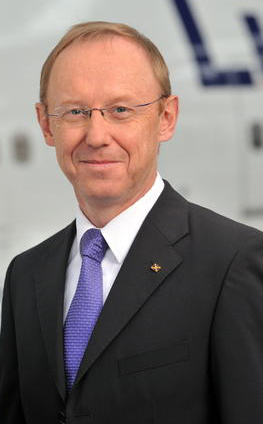 |
Said Garnadt:
“We learned during the crisis to
react faster to market changes.
“That strength paid off as the economy
gathered momentum.”
In charts he presented at the annual press
conference, he highlighted the contribution of special products to his
airline’s profits.
The express segment grew by 118 percent,
dangerous goods, pharmaceutical and products of the bio-technology increased
71 percent, and valuable goods saw a plus of 25 percentage points.
Another major contributor to Lufthansa
Cargo’s positive results were generated from its home-base in
Frankfurt, by far Europe’s biggest consolidation hub.
At FRA, almost three times as many tons
of air freight are bundled as they are in Paris, Amsterdam or Milan,
and almost twice as many as in London.
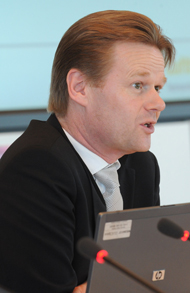 “Frankfurt
is a big asset we strongly rely on,” said Peter Gerber, (left)
board member Finance & Human Resources at LH Cargo. “Frankfurt
is a big asset we strongly rely on,” said Peter Gerber, (left)
board member Finance & Human Resources at LH Cargo.
However, the airport operations are threatened
by a proposed ban of night flights, which could be imposed by Germany’s
Federal Administrative Court as a possible consequence of the increase
in traffic and noise caused by the newly built northwest runway. The
ban would potentially be operational next October.
“In that case, Lufthansa Cargo’s
operations will be hit hard since the carrier is dependent on a certain
number of night flights on routes between East Asia and Europe.
“We currently account for approximately
ten movements each night depending on weekdays, but at an assumed yearly
growth rate of five to six percent we’ll need additional slots
for securing further growth at our main hub,” Garnadt claimed.
Meanwhile, the court’s decision
is expected during the first half of 2012 rather than in fall of this
year, as previously presumed.
As a possible reason for the delay, Lufthansa
Cargo offered “The matter is highly complicated,”
Night flights are also relevant for the
development of jobs at the cargo airline’s hub.
“For this year we expect to increase
the number of positions by around 250,” said Peter Gerber.
Garnadt said his company will invest in
three major business segments for safeguarding future viability:
IT infrastructure, the rebuilding of Lufthansa Cargo’s ground
infrastructure at Frankfurt airport, namely the warehouse in the northern
part of Rhein/Main, and the further development of the fleet.
Herr Garnadt emphasized that the announced
order of five B777-200 freighters that will join the fleet between 2013
and 2015 is not a predisposition for future aircraft orders of this
Boeing variant.
“We would be very glad if competitor
Airbus could offer a cargo plane as a possible alternative to the B777F,”
he said when asked by Air Cargo News/FlyingTypers.
This (next) order, however, will not be
placed earlier than 2018.
Heiner Siegmund/Flossie
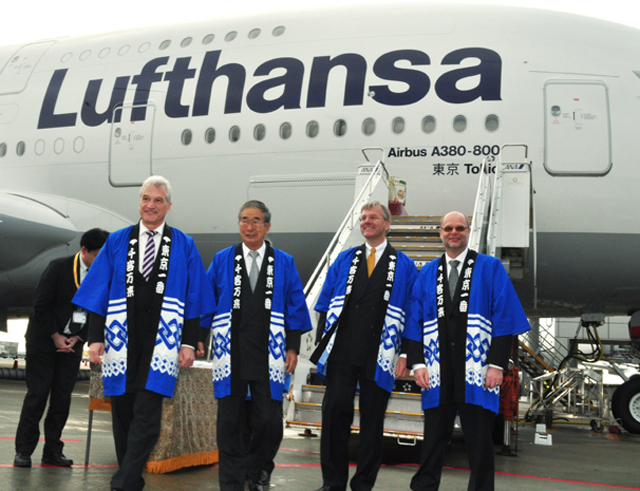
Good Friends, Happier Times…
Lufthansa CEO Christopher
Franz (2nd R) and Tokyo Governor Shintaro Ishihara (2nd L) attend
the 50th anniversary ceremony of the German airline's maiden
Tokyo flight beside its Airbus A380, named 'Tokyo' at Narita
International airport in Narita on January 24, 2011.
Lufthansa Cargo provided a “no
charge” o MD-11 freighter and crew filled with 70-plus
tons of relief supplies today Wednesday, March 23 from FrankfurttoTokyo
in support of the earthquake victims in Japan.
The carrier also said, "In Japan,
we are still diverting our NRT flights to Osaka and we do checks
for radioactivity before the shipments are loaded. So far we
have not seen any unusual results. The flights to/from Japan
are quite full, so there are no signs of a lasting impact on
business.
"The unrest in the Middle
East is of course worrying us too and everybody is looking to
Libya. From a business perspective, it will be the development
of oil prices that could have effects for airlines."
|
|



 “Frankfurt
is a big asset we strongly rely on,” said Peter Gerber, (left)
board member Finance & Human Resources at LH Cargo.
“Frankfurt
is a big asset we strongly rely on,” said Peter Gerber, (left)
board member Finance & Human Resources at LH Cargo.

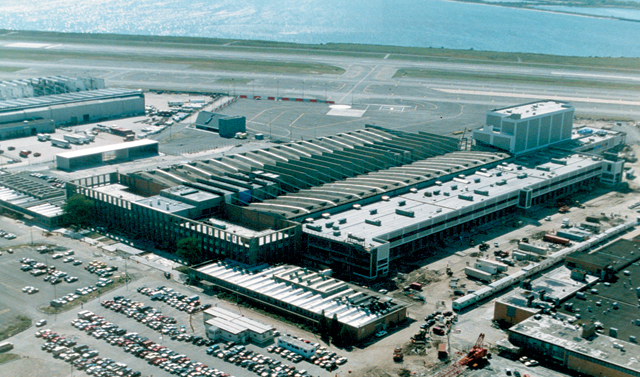
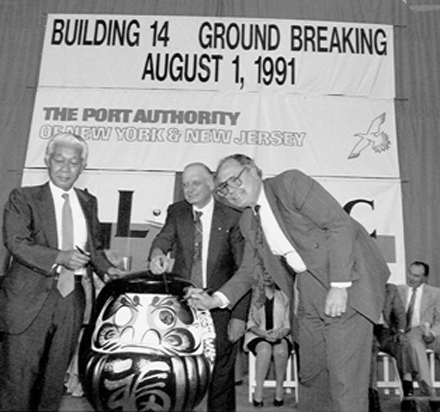 JAL
Cargo JFK as a multi-tenant facility was designed to handle 20% of the
total throughput of all air cargo at JFK.
JAL
Cargo JFK as a multi-tenant facility was designed to handle 20% of the
total throughput of all air cargo at JFK.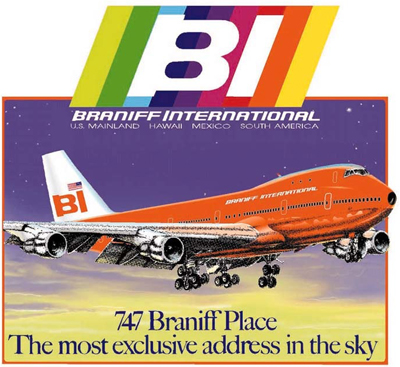 Blast
from The Past . . .
Blast
from The Past . . .  Our
monthly meetings were held at the Playboy Club on E. 59th St.
Our
monthly meetings were held at the Playboy Club on E. 59th St.